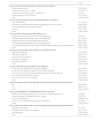The Organic Law Regulating Euthanasia (LORE, for its initials in Spanish) came into force in June 2021. This study aims to examine knowledge of the LORE among physicians licensed in Spain as well as their involvement with and the impact of the law.
MethodsThis work is a descriptive, cross-sectional study conducted by means of a survey. Information was gathered through a self-administered questionnaire.
ResultsThe survey was answered by 1446 physicians licensed in Spain. The samples' demographic characteristics were as follows: 54.7% were women, the mean age was 52 ± 14 years, and 66.0% worked in a hospital. Catalonia was the autonomous community with the most participants (44.6%). Regarding specialties, anesthesiology and resuscitation had the highest number of participants (21.9%), followed by family and community medicine (18.5%). The LORE was known in detail by 24.3% of physicians, 58.0% had a positive opinion of it, and 31.1% had direct experience with the euthanasia procedure. Practitioners working in the hospital setting perceived the law more favorably compared to those in the primary care setting (62.3% vs. 47.3%, p < 0.01).
ConclusionsMost doctors did not have in-depth knowledge of the LORE, although a majority supported its existence, particularly those in hospital medicine. Most physicians who viewed the LORE negatively were male, older, and worked in primary care. A minority of physicians considered registering as conscientious objectors.
En junio de 2021 se produjo la entrada en vigor de la ley orgánica reguladora de la eutanasia (LORE). Este estudio tiene como objetivo analizar el conocimiento, implicación y repercusión de la LORE por parte de los médicos colegiados en España.
MétodosEstudio descriptivo y con un diseño transversal mediante encuesta. La información se recogió mediante un cuestionario autoadministrado.
ResultadosLa encuesta fue respondida por 1.446 médicos colegiados en España. Características demográficas de la muestra: un 54,7% eran mujeres, la edad media de los facultativos fue de 52 ± 14 años, un 66,0% trabajaba en un hospital, y la comunidad autónoma con mayor número de participantes fue Cataluña con un 44,6%. Por especialidades, anestesiología y reanimación, con un 21,9%, fue la especialidad con mayor número de participantes, seguida por medicina familiar y comunitaria (18,5%). Un 24,3% de los médicos afirmó conocer la LORE en detalle, un 58,0% tenían una opinión favorable, y un 31,1% habían tenido alguna experiencia cercana con el procedimiento eutanásico. Los facultativos que trabajaban dentro del ámbito hospitalario percibieron la ley de forma más favorable en comparación con los de medicina primaria (62,3% vs 47,3%, p < 0,01).
ConclusionesLa gran mayoría de médicos no conocían la LORE, aunque estaban a favor de su existència, sobre todo médicos de medicina hospitalaria. Los médicos con mayor percepción negativa de la LORE eran varones, de edad más avanzada y trabajadores de atención primaria. Una minoría de los médicos se planteaba ser objetor de conciencia.
Article
Diríjase desde aquí a la web de la >>>FESEMI<<< e inicie sesión mediante el formulario que se encuentra en la barra superior, pulsando sobre el candado.

Una vez autentificado, en la misma web de FESEMI, en el menú superior, elija la opción deseada.

>>>FESEMI<<<












